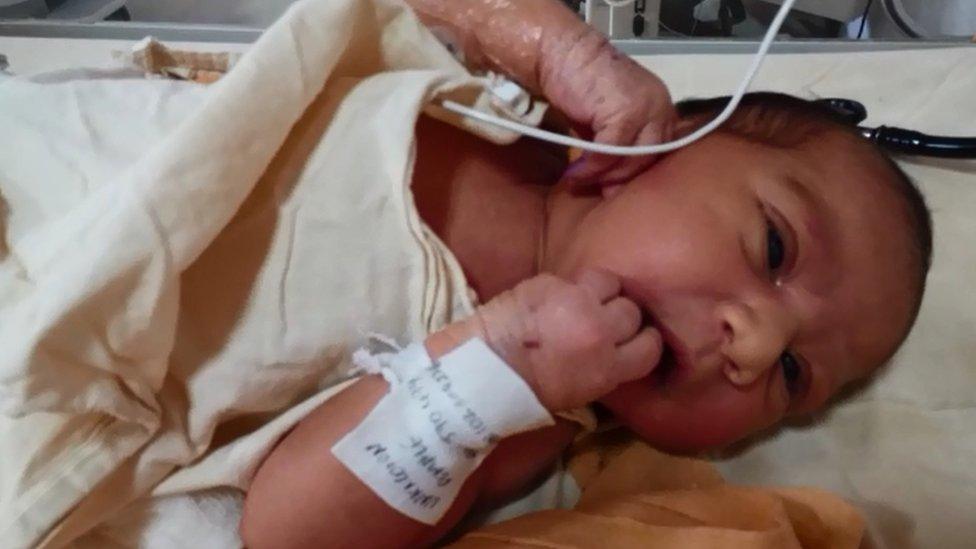India newborn girl found in shallow grave 'fighting for life'
- Published
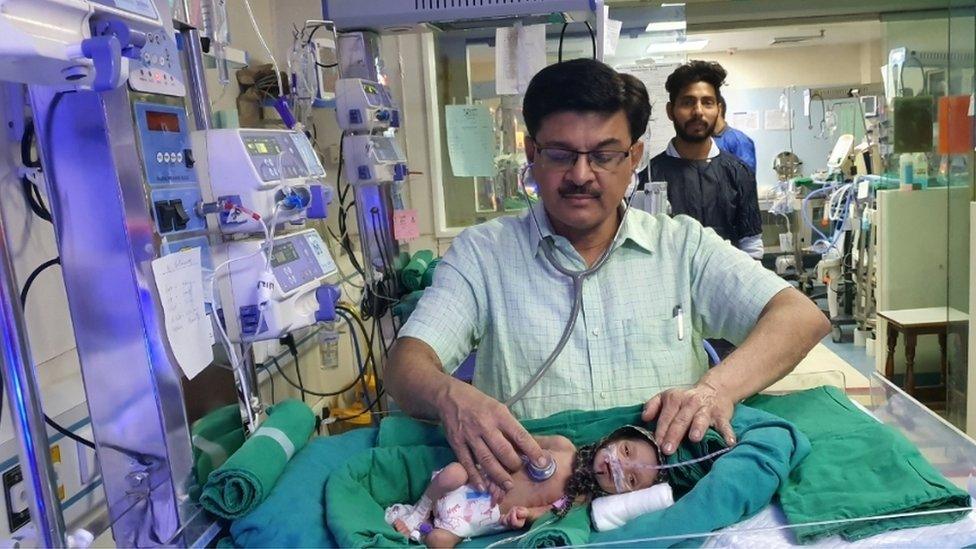
Dr Khanna says the baby has a dangerously low platelet count and a blood infection
A newborn baby discovered buried alive in a clay pot in northern India is fighting for her life, her doctor says.
She remains in a "critical" condition, suffering from septicaemia and a dangerously low platelet count, paediatrician Ravi Khanna said.
"There are chances of her survival, but we would know for sure only after five to seven days," he told the BBC.
Police have lodged a criminal case against "unknown persons" and say they are looking for the girl's parents.
They have not speculated on possible motives, but India's gender ratio is one of the worst in the world. Women are often discriminated against socially and girls are seen as a financial burden, particularly among poor communities.
Abhinandan Singh, senior police officer in Bareilly district where the girl was found, told the BBC he suspected the parents' involvement in her burial because "even after the case has been widely publicised, no-one has come forward to claim her".
The newborn was found accidentally on Thursday by a villager who was burying his own daughter, who was stillborn. Hindus generally cremate their dead, but babies and young children are often buried.
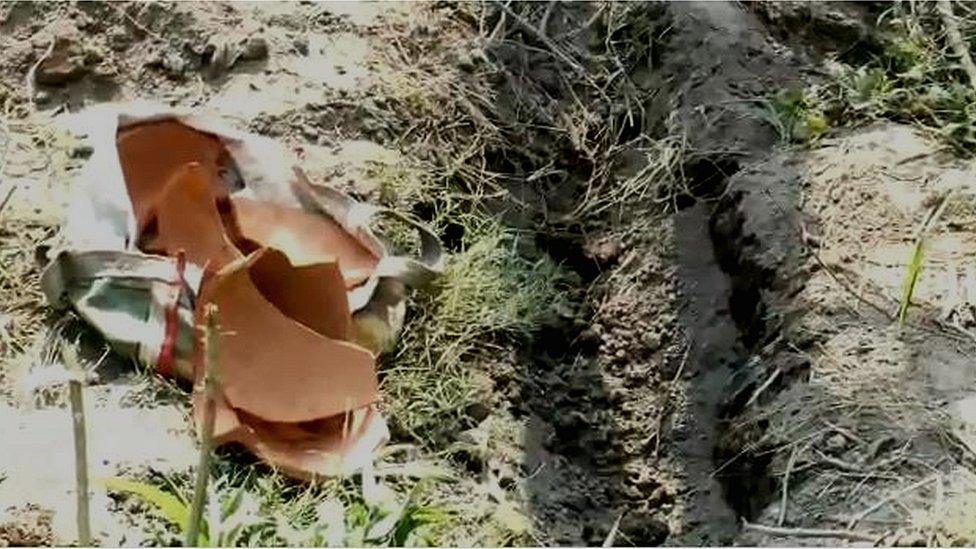
The newborn was found buried alive in a clay pot inside a cloth bag
"When they had dug about 3ft [90cm] below the ground, their shovel hit the earthen pot which broke and they could hear a baby crying. When they pulled out the pot, they found a baby in it," Mr Singh said.
The baby was taken to the local government hospital and admitted to the neonatal intensive care unit.
"I think she was about a week old when she was brought into the hospital," chief paediatrician Dr Saurabh Anjan told the BBC over the phone from Bareilly.
"She was a premature baby, possibly born at 30 weeks, and weighed a mere 1.1kg [2.4lb] which is a very low birth weight."
Dr Anjan said she had also been hypothermic (her body temperature was 35C, well below the normal 36.5C) and had hypoglycaemia (her blood sugar level was 35 when it should have been at least 45).
"She was tiny and very weak, we immediately put her on oxygen and began treating her for hypothermia."
The baby was moved to Dr Ravi Khanna's paediatric hospital on Sunday, because it has better facilities.
"She is being kept in the intensive care unit and is being fed fluids through a tube. Her condition is critical. Her platelet count has dropped to 10,000 while the normal range is 150,000 to 450,000, so we are concerned about the infection in her blood," Dr Khanna told the BBC on Tuesday.
There are differing estimates on how long the baby lay buried under ground and the doctors say they can only guess how she survived.
Dr Khanna said she might have been buried as long as "three to four days".
"She survived on her brown fat. Babies are born with fat on their abdomen, thigh and cheek and they can survive on it in an emergency for some time. Once she exhausted that, she shrivelled up - as you can see in her photograph," he said.
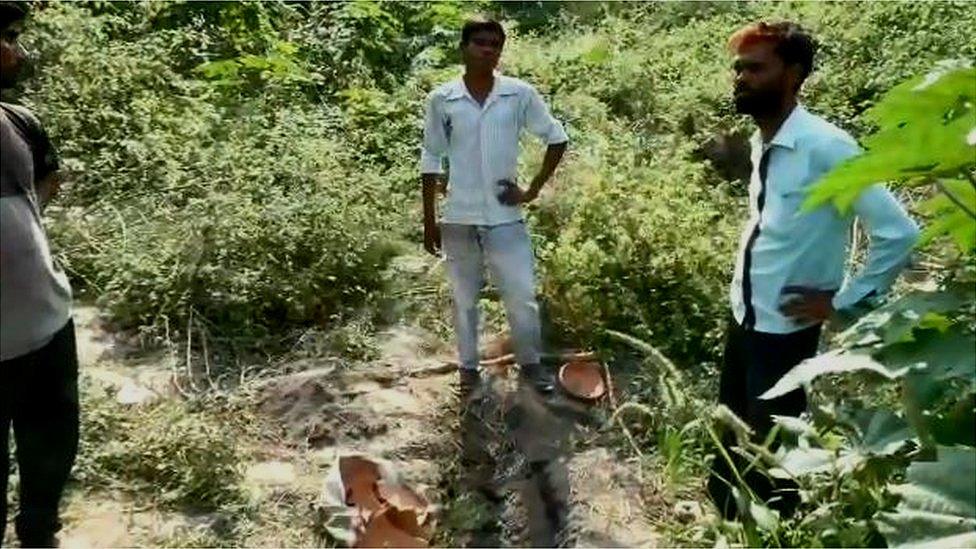
Gravediggers are seen with the remains of the pot, which was found nearly a metre under ground
But Dr Anjan gives a far more conservative estimate. He believes she was only buried for "two to three hours" and might have survived for "another hour or two" if she hadn't been rescued.
He says there would have been an air pocket inside the pot which would have provided her with oxygen. Also, it's possible some oxygen may have filtered through the loose soil, while the fact the pot was not made of dense clay could have helped as well.
Local state politician Rajesh Kumar Mishra, from the governing Bharatiya Janata Party (BJP), says he has "adopted" the baby and that once she is better, she will be raised by him and his wife in their home.
"It's a miracle that she survived, I believe that god has saved her life and sent her to me. Now it's our duty to do everything for her. She is oscillating between life and death. Once she recovers, I will take her home and raise her as my daughter," he told the BBC.
Mr Mishra has named her Sita after a Hindu goddess who, according to the popular mythological text Ramayana, was found by King Janak when he was ploughing a field.
"I visit the hospital several times a day to check on the baby. This afternoon when I visited her along with my wife, I called out her name and she opened her eyes, stretched, and looked at me," he said.
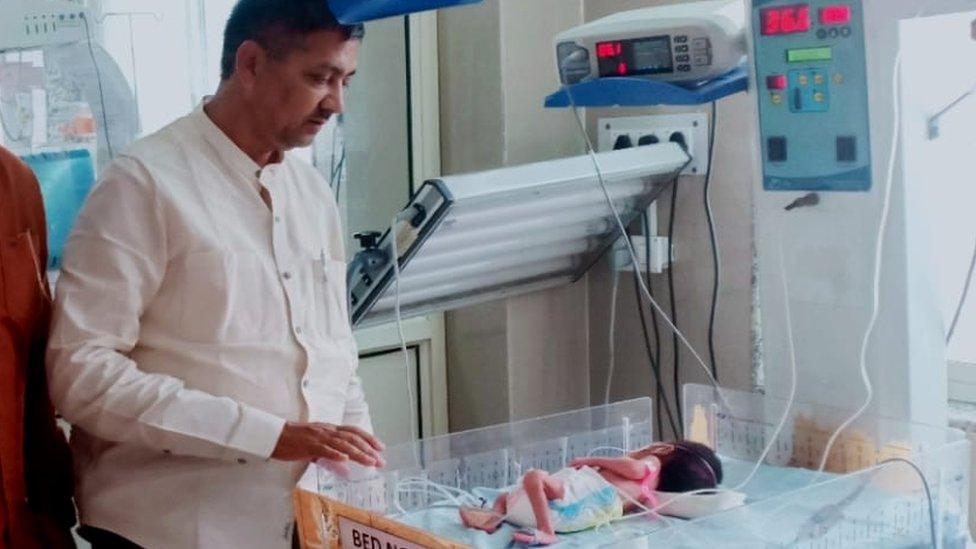
Politician Rajesh Kumar Mishra says he wants to adopt the baby
The baby girl's abandonment is under investigation and police say they suspect her parents could be complicit in the burial.
Abandonment and murder of baby girls in India is not uncommon - there has been a traditional preference for sons over daughters, fuelled by a widely-held belief that a boy will carry forward the family name and look after his parents in their old age, while daughters cost families dowries and marry to live with the husband.
Although most unwanted female foetuses are aborted with help from illegal sex determination clinics, cases of baby girls being killed after birth are not uncommon either. This has also led to a dangerously skewed sex ratio in the country.
Mr Mishra says: "I don't know what was the compulsion of her biological parents that they abandoned her and buried her, all I can say is that what they did was not right.
"I'm praying for her health and long life. I believe the entire world is praying for her survival, for her good health."
- Published25 July 2019
- Published23 May 2011
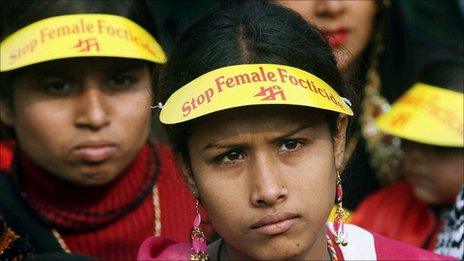
- Published24 October 2016
